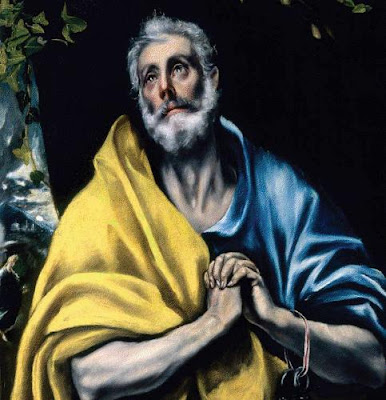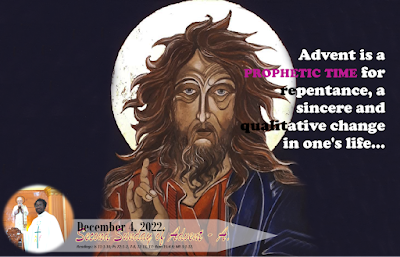IF NOT TO THE LORD, TO WHOM SHALL WE GO?
August 22, 2021
Twenty-first Sunday in Ordinary Time – B.
A French proverb says: “God alone understands fools.” And a
Ganda proverb adds: “An ugly child of your own is more to you than a beautiful
one belonging to your neighbor.”
When one experienced all the graciousness and great actions
of God in his life, he cannot turn another way around but adore him with
sincerity. Assuredly, the heart of mankind is the most inconsistent thing that
exists and it easily waves in confront of situations. But when one regains
conscience, he realizes he has no other hope of life but God. With a little
lucidity, I came to the conclusion that man is a situational or circumstantial
being, nevertheless, after all, he is also a being for God, intrinsically
linked to God as the husband is linked to his wife.
Christian life could be seen as a spousal relationship with Christ.
It has its ups and downs, but in the end, just like wives and husbands must
remain intimately united, so must we be with Christ, and through him with God.
One sentence, the answer of Peter to the Lord, gives the
color and deep message of today's liturgy: “Master, to whom shall we go? You
have the words of eternal life. We have come to believe and are convinced that
you are the Holy One of God.” To whom shall we go searching for life, if not to
the Lord and him alone?
In the first reading, Joshua brings the children of Israel
to make that decisive choice. “If it does not please you to serve the LORD,
decide today whom you will serve, the gods your fathers served beyond the River
or the gods of the Amorites in whose country you are now dwelling. As for me
and my household, we will serve the LORD.” As a leader, he starts first making
the choice for him and his family, to follow the Lord who saved them. The
people recounted all the great actions of the Lord, how he saved them from
Egypt, led them through the desert, and brought them to the land where they now
are living. Looking at all these gracious actions, Israel cannot, but decide to
follow the God who gives them life. And actually, it will be foolish and
stubborn to leave a life-giving Lord and serve idols. Israel will not remain
always faithful to that promise, but at least, they know who is their God.
Analogy obliges, a husband, even though he might be unfaithful does not forget
who his wife is. So too will Israel not forget who is their true God.
In the Gospel, the disciples of the Lord are also brought to
make a decisional choice, follow the Lord or depart from him. This is
consecutive to the great teaching of Jesus about the bread of life. We remember
that after the multiplication of the five barley loaves and the two fish to
feed miraculously the five thousand people, a great crowd followed the Lord.
They were amazed and attracted by miracles as many Christians are today. But
then the Lord started the doctrinal teaching on the bread of life and reached
the conclusion of him being the true bread of life, his Body as life-giving
bread. Upon hearing that, many among his followers got scandalized and stopped
following him. So, today, the Lord Jesus turns to his closed disciples and
question: "What about you, do you want to go away too?"
Time has come to make the choice; will they still follow him
or depart from him? Peter as a leader, just like Joshua did in the first
reading, answers: “Master, to whom shall we go? You have the words of eternal
life.” If not to the Lord, where can a man run for life? When we realize how
much goodness the Lord does for us, how we are loved and cared for by him, it
will be sad to depart from him. And besides, to leave God who gives life is to
open oneself to a lifeless existence, that is, to death. No one can be away
from God and hope to live. Without God, we are dead. As sing the Psalmist,
"Many are the troubles of the just one, but out of them all the Lord
delivers him; he watches over all his bones; not one of them shall be
broken." Who else can do this, if not God? When one tastes and sees how
good the Lord is, he can only always come back to him and stay with him.
St. Paul, in the second reading, compares our remaining with
the Lord to the matrimonial union between husband and wife. The Apostle says
that what makes the strength of marital relationships are subordination or
obedience and love. Wives, he says, "should be subordinate to their
husbands as to the Lord." And "husbands should love their wives as
their own bodies", and even more, "as Christ loved the Church and
handed himself over for her to sanctify her..." The Apostle ends by
saying, "This is a great mystery".
Just like the matrimonial union is a great mystery, so too
is our relationship with God a sublime mystery. It is made of infidelities,
rejections, denials, and a lack of consistency on our side, but we cannot do
otherwise but stay with God. For, away from him, we are dead.
Though society today tries to teach us that man
and technology are supreme masters of all things and that one can manage his
life without religion or without God, we reach more than often the conclusion
that God is essential and not secondary or subsidiary. The Pandemic of the
COVID-19 is proof of the essentiality of God. Science and technology have been
shown to be limited. So, to whom shall we go for life, if not to him?





Comments
Post a Comment